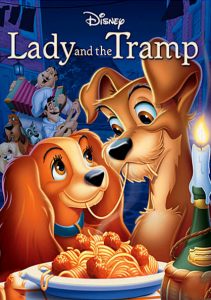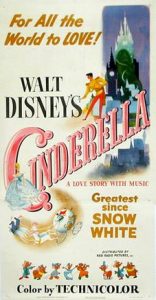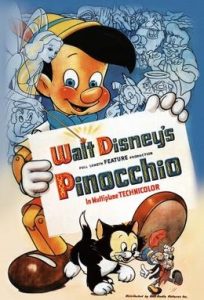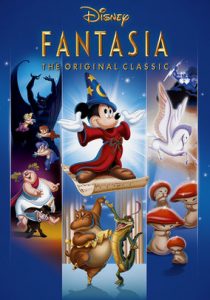Lady and the Tramp-1955
Director Clyde Geronimi
Voices Peggy Lee, Barbara Luddy, Larry Roberts
Scott’s Review #894
Reviewed May 5, 2019
Grade: A-
Released midway through a decade of prosperity, Lady and the Tramp (1955) is a lovely production that represents an innocent time and still holds up well decades later.
The Walt Disney film’s story, animations, and characters are charming, with a wholesome yet sophisticated vibrancy. A year in the life of its main character (Lady) has never been more richly created, providing adventure, romance, and fun for the entire family.
At the turn of the twentieth century, John Dear, presumed to be somewhere in the midwestern part of the United States, gives his wife Darling a Cocker Spaniel puppy that she names Lady.
The couple is immediately smitten with Lady, who provides her with all the comforts of warm and lavish country living.
After months, the Dears become pregnant, causing Lady to feel left out. When the baby arrives and the Dear’s go on a trip, their dog-hating and incompetent Aunt Sarah arrives, leaving poor Lady at risk for her life.
Meanwhile, a stray mixed-breed named Tramp prowls the streets, protecting his friends and avoiding the dog catcher. He dines on Italian leftovers at Tony’s and lives his idyllic life, proud not to be owned and able to live on his terms.
He befriends Lady through mutual acquaintances Jock and Trusty, who reside nearby.
When Lady faces peril, the duo embarks on an exciting escapade that leads them to a dog shelter and a farm. They fall in love, resulting in a candlelit dinner for two at Tony’s, which is the highlight.
All the animals are treasures and voiced appropriately, giving Lady and the Tramp life and zest. Tramp is gruff yet lovable, with a “footloose and collar-free” outlook. He is charming and bold in his determination.
Lady’s voice is the polar opposite—demure, feminine, and proper. It is cultured without being too snobbish.
In supporting roles, Tramp’s fellow strays Peg (a Pekingese) and Bull (a bulldog) possess a New York street-savvy, perfect for their characters.
Besides Aunt Sarah, the dog catcher, and a hungry rat, Lady and the Tramp contain no villains, and each character is somewhat justified in their motivations. The rat wants to eat, the dog catcher is doing his job, and Aunt Sarah, a cat lover with two Siamese pets, is foolhardier and more clueless.
She can be forgiven for wanting Lady to have a muzzle because she misunderstands Lady’s intentions toward the newborn baby. These characters are more comical than deadly, and Si and Am add mischievous shenanigans to further the plot.
The heart belongs to the sweet romance between Lady and Tramp. The two dogs immediately appeal to the audience with instant chemistry.
The “Footloose and Collar-Free / A Night at the Restaurant / Bella Notte” medley is the best arrangement of the songs, as the duo shares a delicious plate of spaghetti and meatballs.
In the film’s most iconic and recognizable scene, the pair lovingly munches on the same spaghetti noodle—if that is not love, what is?
Lady and the Tramp (1955) is a charmer containing innocence, vivid colors, and a rich, welcoming story.
Beginning on Christmas and ending precisely a year later, Lady and Tramp’s incredible journey is topsy-turvy but culminates in the birth of a litter of puppies cheerily celebrating life.
The happy ending is a perfect bow on a Disney film that is enchanting, harmless, and inspiring.
The quintessential American love story between the pampered heiress and the spontaneous, fun-loving pup from the wrong side of the tracks — has rarely been more elegantly and entertainingly told.



